Aspen Environment Forum: Balancing hope and despair with big ideas
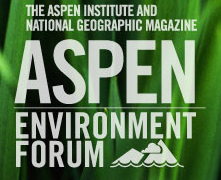
ASPEN – Are we in an endgame struggle for survival or do we face the greatest opportunities in the history of civilization?
Both.
Granted, the messages remain grim, perhaps even darker than I had expected here under the blue skies at the Aspen Environment Forum. But of all the gatherings I’ve attended this year, I’ve never felt such a tipping point of camaraderie and conviction that unify business, environmentalists, investors and the public.
Perhaps it’s just the crisp air and the informal, collegial atmosphere nurtured by the Aspen Institute’s tradition of convening diverse groups to tackle complicated, timely issues. Maybe it’s the powerful imagery we’ve seen presented by National Geographic photographers such as Jim Richardson who gave us an appreciation for soil, Paul Nicklen who took us to the melting poles, Jim Balog who shared the majesty of ice and Nick Nichols who tortures himself to make the most captivating wildlife pictures in the most remote parts of the world.
But unlike some conferences, there isn’t an air of back-room negotiations or tag-teams of special interests working the coffee bar. Surely, some participants and speakers wear their convictions and contentions on their sleeves, and some are resolute skeptics or doomsayers. But as Amy Coen told me last night, “This just feels different.” She’s president of Population Action International and is here to speak on the human footprint and climate issues related to population. “We all need to learn to listen better and this is a good place to do that.”
Just before the forum, organizers asked me to be one of six speakers to help open the forum with a “big idea.” But how could I give these big thinkers an even bigger idea?
I turned to the biggest thinkers I could find.
First, I went to our 7-year-old daughter for inspiration. Just before I left home to come to Aspen, we listened to Jack and the Beanstalk together. It’s all about magic beans. But in water, climate and energy we know there are no magic beans, no matter how hard we try to find them. Solving these issues requires commitment, innovation and mass collaboration.
Second, I found Pulitzer-winning biologist E.O. Wilson at breakfast Thursday morning and he enthusiastically described his latest book, a venture into fact-inspired fiction that’s a present day version of Orwell’s Animal Farm. “Anthill,” which he just completed and sent to his agent, is a story about an ant colony’s struggle for survival in the expansive world of a picnic area. Story is the realm in which we can explore new worlds and shape powerful drama, he said.
“We’ve done the science,” Professor Wilson added. “The human mind is based on scenarios, so now it’s time to tell the stories.”
Throughout the evolution of human culture – and Professor Wilson knows a lot about evolution – we’ve shared our stories, our histories. So that’s the other part of my Big Idea: We need to tell better stories.
Better stories, no magic beans. Simple, yes? As old as history and fairy tales.
The forum wraps up today with a panoply of sessions, ranging from “Living with Coal,” which is sure to generate vigorous discussion, to “Journalism and Coverage of the Environment.”
The forum certainly has sparked discussion and debate that will carry on long after we go back to our offices, whether in the headquarters of a major corporation wrestling with the “now what” of sustainability or a research camp upon the Greenland ice. Unfortunately, no one will leave the forum with a magic bean to fix the world’s woes. But we leave inspired by our colleagues and their passions to creating a better world. We all agree that at every tick of the clock there are the expansive, personal stories of drama, tragedy, hope and inspiration unfolding in our own backyards and around the world.
How we tell those stories – and how we respond – will define whether we’re writing our prologue or final chapter.
Related links
Water: Aspen Environment Forum – Circle of Blue
PlumTV – interview
PlumTV – Aspen Environment Forum conversation
Grist – Big Ideas at the Aspen Environment Forum
J. Carl Ganter is co-founder and managing director of Circle of Blue. He is a journalist and photojournalist, recipient of the Rockefeller Foundation Centennial Innovation Award, and an Explorers Club Fellow.

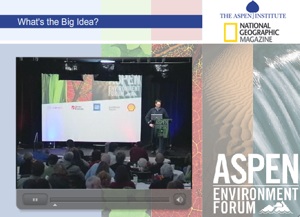
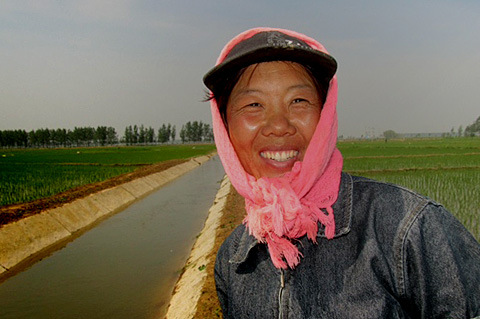
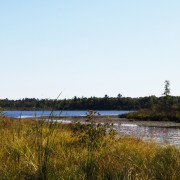
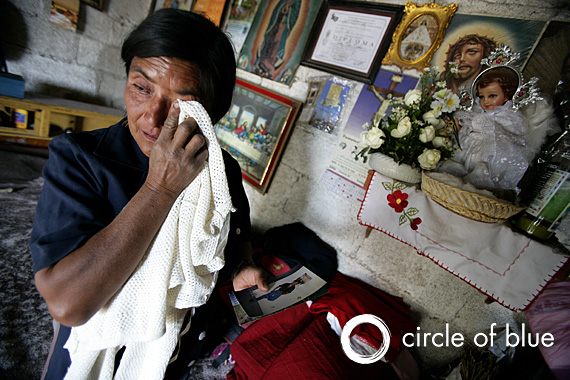


Leave a Reply
Want to join the discussion?Feel free to contribute!